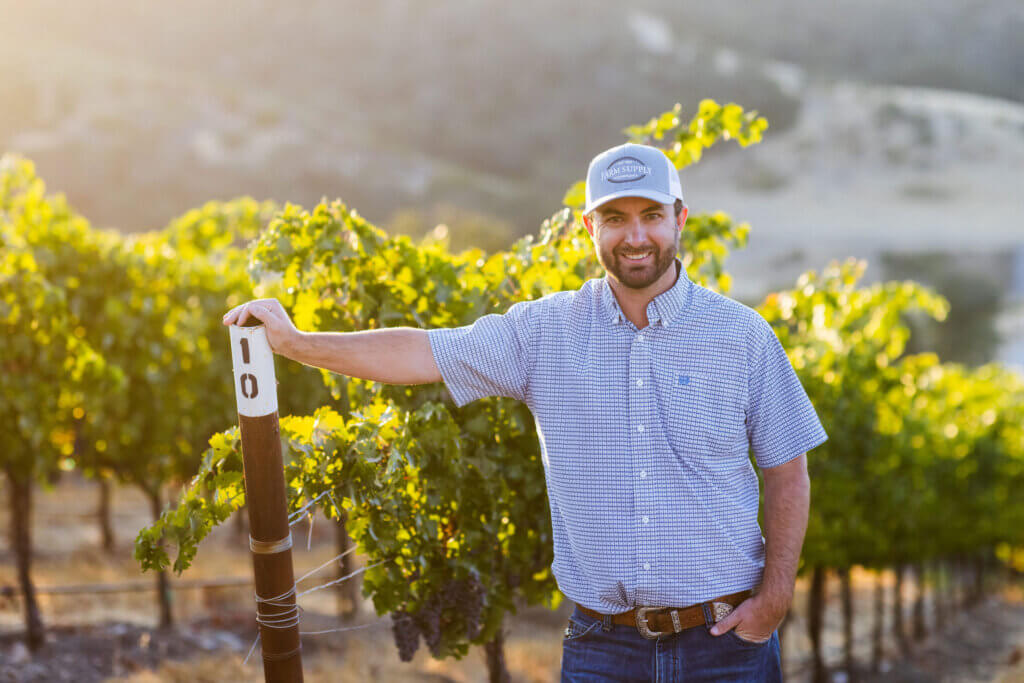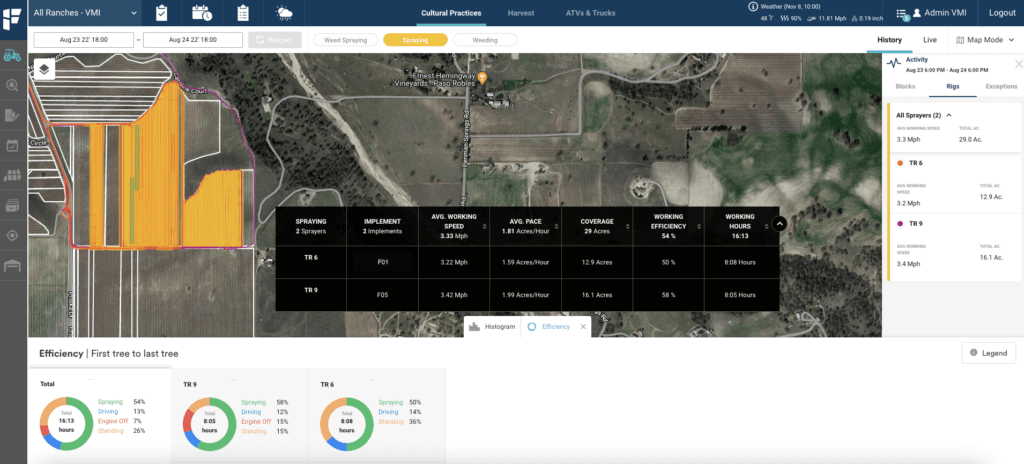As a vineyard management company, Viticultural Management, Inc. (VMI)’s business is based on operational efficiency. Their success relies on how efficiently they’re able to utilize their equipment and labor resources to complete jobs across their owned and managed properties. Speed is important, but ensuring that jobs are completed to quality standards is equally important.
When Carter Collins, General Manager at VMI, began evaluating Fieldin last year, he was looking for a solution to help their business keep pace with changing labor laws while allowing them to be more strategic with their fleet and crews. “Going from 60-hour work weeks to 40-hour work weeks over the past several years has forced us to be much more cognizant of shift times and efficiency within shifts,” says Carter.

“I can’t be everywhere at once and neither can our supervisors. We knew we could do better but before Fieldin, we didn’t have the information to tell us how.”
Carter Collins
General Manager, VMI
Adjusting rate schedules based on Fieldin efficiency data has resulted in significant cost savings
Prior to Fieldin, VMI’s rate schedules were based on a best guess of what they believed to be true from a combination of pen-and-paper reporting and talking with supervisors. They had a general idea of the amount of equipment being used to cover a particular area, but they had no way of accounting for wildcards such as breakdowns or crew members not showing up for work.
With the granular data that Fieldin has provided into their operations, Carter and his team are now able to see a complete picture of how their operational efficiencies vary across properties. After collecting data over an entire season, they discovered that they had been underestimating their efficiency metrics in certain areas. Following this discovery, they calibrated their rate schedules, which in turn allowed them to reduce their operating budget on their owned properties, while also passing along cost savings to their customers to deepen trust and brand loyalty.
Training opportunities enable operators to cover a full extra day’s worth of work in a week
One of the first areas where Fieldin data was able to deliver immediate value for VMI was in comparing efficiencies across operators and identifying areas for improvement. Carter and his team of supervisors rely heavily on Fieldin’s shift data and efficiency metrics to understand the activity breakdown of area covered by their crew in a workday.
Fungicide spray season is one of the busiest times of year for Carter and his crew. They must stick to tight schedules in order to get through all of their properties and cycle back for the next spray.
Last summer, when evaluating one of their spray shifts, they noticed a discrepancy between two operators. The target speed for this particular application was 3.5mph. One of the operators was sticking close to this target with an average of 3.42mph, but the other was lagging behind at 3.22mph. What may seem like a slight difference actually added up to a difference of 3.2 acres/shift and 16 acres/week, a full extra day’s worth of work in a week.

On top of the productivity gap that they identified, and perhaps more importantly, they were concerned about the quality of the spray application. The slower speed meant that they were over-applying chemicals, resulting in excess material costs and potential damage to the vines. According to Carter, “Some tractor operators aren’t as comfortable driving through the vineyard rows and that’s fine, but we need to know so that we can adjust the sprayer to the appropriate application rate to apply the right amount of chemicals.”
Similarly, during harvest, they identified an operator who was picking 3-7 more acres per shift than the rest of the crew. Upon further evaluation, they learned that this operator was using a more efficient style of turning at the ends of rows that enabled the gondolas to stay in sync with the harvesters. They were able to use this as a training opportunity for the rest of the crews, which allowed them to cover more acres, faster. In a low-crop year like last year, where they were having to pick 7-9 acres for a single truckload (compared to ~5 acres in a higher crop year), these efficiency gains were critical to keep up with demand.
Leveraging historical data to strategically plan for the upcoming season
Heading into the coming season, the VMI team is leveraging a year’s worth of data on the Fieldin platform to be more strategic in their planning. In fact, Carter used the winter herbicide application as a test program to inform the upcoming fungicide spraying season. They know they need to get through all of their ranches as quickly as possible, but with ranches ranging from 10 acres to 500 acres, they need to be calculated in their approach.
“Keeping our equipment in an optimized rotation to serve all of the vineyard’s needs in a timely manner is always top-of-mind for me. Fieldin gives me the data I need to plan the best utilization of my equipment and complete properties as fast as possible.”
Carter Collins
General Manager, VMI
When designing the test program, they first looked back at their data over the past year and identified that they can cover 12-15 acres per day with each sprayer. They then looked at how many sprayers they have in their fleet. The first ranch they started with is a 65-acre ranch, and they quickly realized that 6-7 sprayers was too much equipment for a ranch of that size. Instead, they decided that it was better to use a 4-person crew and extend the job over 2 days. This way, they could leave some equipment behind on the second day while they mobilized the rest of the equipment to start on another job. By the time the crew finished and got to the larger vineyard, they already had 6-7 sprayers going and they were able to complete a 150-180 property in 2-3 days.
“To conduct a test like this without Fieldin would have been a total guess. Using our historical data as a starting point, we’ve been able to guide our planning and decision making in the field,” says Carter.
Prior to Fieldin, they had equipment spread out all over, but heading into this season, they’ve put in the effort to carefully plan for optimal utilization of their equipment and team. Carter hopes to learn a few things in carrying out this season’s planning, including:
- Do we have the right amount of tractor drivers?
- How many tractor drivers does it take to complete all of our properties and how many extras does that leave us to perform other jobs on the vineyard?
- How do we plan for and time all of the other jobs that need to get done during spray season (e.g. leafing, mowing, under-vine cultivation, etc.)?
Looking ahead, the VMI team also intends to use their Fieldin data to inform their equipment purchase decisions. If they see, for example, that they have two tractors that sat for the majority of the season, maybe they can remove that capex expense from their balance sheet. On the flip side, they might learn that they’re struggling to keep up with mowing jobs and that they need to invest in more mowers. With data supporting these decisions, they can feel more confident in their planning and investments.






